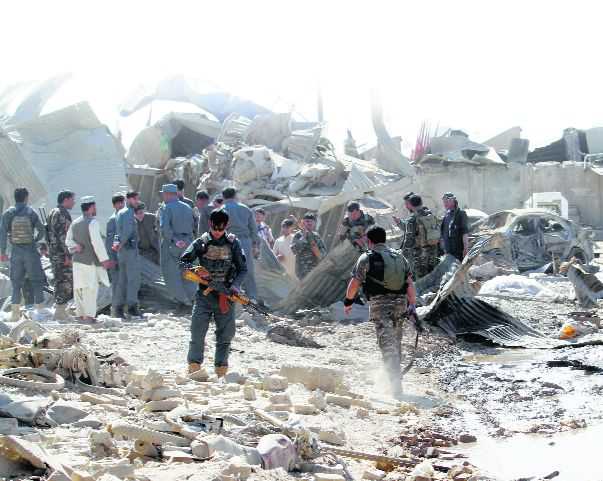At the negotiating table with Khalilzad, the Taliban are unlikely to settle for anything short of the restoration of the Islamic Emirate of Afghanistan. A situation as traumatic as the Afghan transition from communist rule in 1991-92 could be staring at India.

MK Bhadrakumar
Former ambassador
Seventeen years is a long time for a war. Watching the 17-year-old Afghan war — and having witnessed the 18-year-old war that preceded it — nerves have become numb. Reports of violent incidents are an almost daily occurrence and they have ceased to catch the mind’s eye. But the incident in Kandahar city, the throbbing heart of southern Afghanistan, in the afternoon of October 18 was truly stunning.
An attack on a gathering of Afghan and US officials inside the Kandahar Governor’s compound left dead the province’s intelligence chief and police commander, General Abdul Razeq. The NATO-led mission said three of its personnel were wounded, including a US brigadier-general, but that the top US commander in the country, General Austin Miller, who was in the meeting with Razeq, escaped unharmed, thanks to his body armour. The Taliban claimed the strike.
The death of Razeq will have great consequences. He was in reality the unrivalled regional warlord of the entire Afghan south who was admired and courted by the US military and the CIA for his ruthlessness and anti-Taliban prowess. Razeq was an extremely brutal man and in May last year, the United Nations Committee Against Torture released a report describing credible allegations of Razeq’s “complicity, if not of personal implication, in severe human rights abuses, including extrajudicial killings and … secret detention centres.” But he was an indispensable ally for the US, being their most effective warlord and the “kingpin” in the fight against the Taliban in its homeland of southern Afghanistan bordering Pakistan.
There is high probability that with the departure of this charismatic warlord, southern Afghanistan will spin out of control — Afghan forces fragmenting and local commanders vying for power and the security situation dramatically deteriorating. Clearly, Taliban’s intention in eliminating Razeq is to reduce the entire southern region of Afghanistan to turmoil. And with that, Americans will have irretrievably lost the war.
Coincidence or not, in the week after Razeq’s killing, Pakistan released from prison three senior Taliban members, including Mullah Baradar, Mullah Abdul Samad Sani and Mullah Mohammad Rasul. Out of the three, it is Mullah Baradar who makes the headlines. He is a co-founder of the Taliban movement and was the deputy of Mullah Mohammed Omar, the legendary emir of the Islamic Emirate of Afghanistan who died in 2016. Pakistan has been holding Baradar in custody since 2010 on grounds of his perceived inclination to hold peace talks directly with then President Hamid Karzai to end the insurgency.
Baradar’s release has been apparently at the request of the newly appointed US special representative on Afghanistan Zalmay Khalilzad (an ethnic Pashtun himself) who is pursuing a mandated mission by the Trump administration to engage Taliban in talks.
Meanwhile, this is all playing out against the backdrop of a growing realisation in Washington that a face-saving deal with the Taliban can still enable the US to head for the exit door and leave the Hindukush without the appearance of having lost the war. President Trump has not yet announced a timetable for withdrawal, but the growing impression is that a drawdown is on cards and time is running out. It is patently obvious that Trump himself stands disconnected from the war effort — he’s never once visited Afghanistan and has outsourced to Vice-President Pence any conversations needed periodically with Afghan President Ghani.
The Taliban, who control more than half of Afghanistan, and Pakistan, who mentors its leadership, know that the US is desperate to leave. They have begun pushing the envelope in a calibrated way, as the attack in Kandahar city shows, to keep the Americans on the razor’s edge. On the other hand, there is much dismay within Afghanistan, especially among non-Pashtun ethnic groups, that Khalilzad, who is an ambitious careerist and a go-getter, will be in a hurry to report to Trump about Mission Accomplished. Plainly put, Afghans fear that Khalilzad may cut a secret deal with Pakistan. The release of Mullah Baradar, therefore, will set alarm bells ringing in Kabul.
The big question is what is it that the Taliban may be willing to settle for at the negotiating table with Khalilzad? Make no mistake. The Taliban are unlikely to settle for anything short of the restoration of the Islamic Emirate of Afghanistan. Any assumption that the Taliban leadership will reconcile with Ghani government is misplaced. The Taliban have always insisted that only an Islamic system is legitimate.
Succinctly put, in the emergent circumstances, the possibility of the Taliban reconciling with Afghan government and participating in a political process is virtually nil since they are already ruling over much of the country. Perhaps, they may agree for tactical reasons to joining an interim government as a provisional step toward the resurrection of the Islamic Emirate of Afghanistan, which was liquidated by the US through force in 2001. And, of course, Pakistan has no good reason to rein in the Taliban.
A situation as traumatic as the Afghan transition from communist rule in 1991-92 could be staring at India in the face in the near future. Alas, there has been a catastrophic misjudgement by our foreign and security policy establishment.
The right thing to do should have been to welcome the overture by Pakistan’s army chief for dialogue alongside making discreet efforts to have a conversation with the Taliban. Neither happened. Hardliners prevailed.
Our capacity now to leverage US approach is zero. Trump’s Afghan strategy was formulated by then US National Security Adviser HR McMaster with Indian inputs and now that the strategy has failed spectacularly, Indian credibility also takes a hit. The wheel may come full circle if a Taliban regime reopens training camps for Indian militants. Therefore, hasty steps must be avoided.
